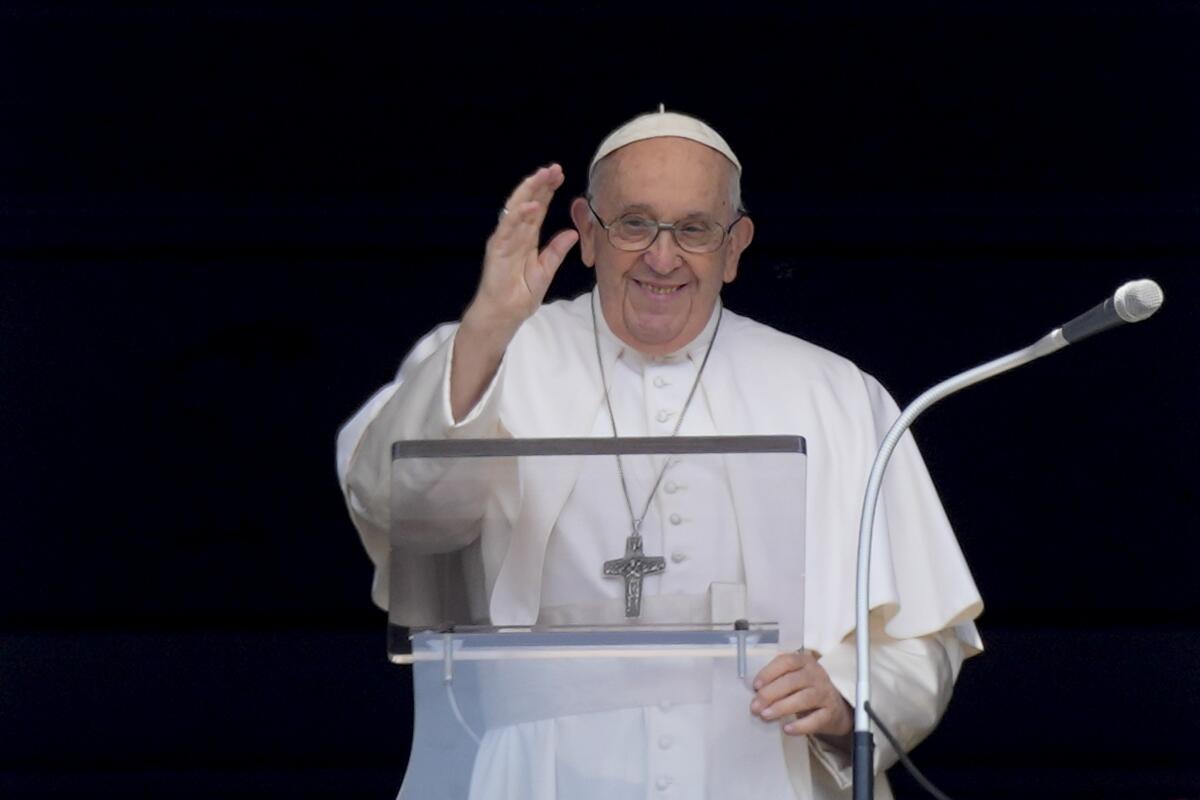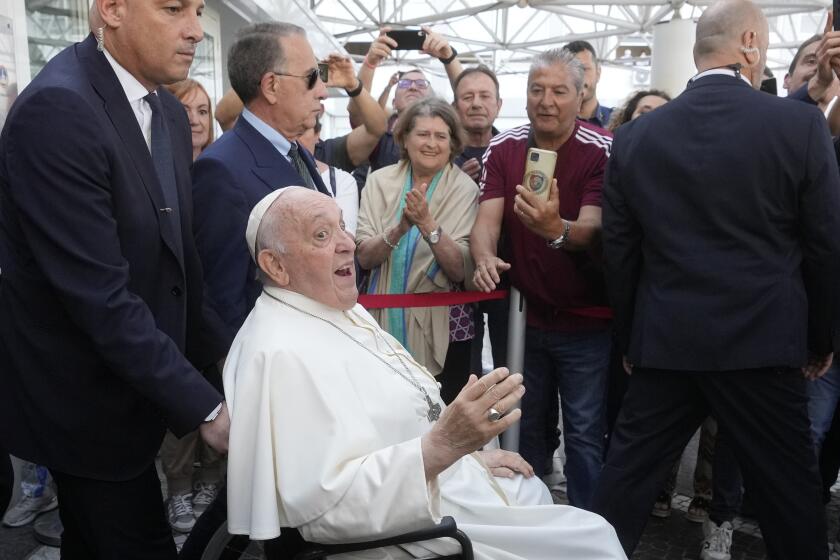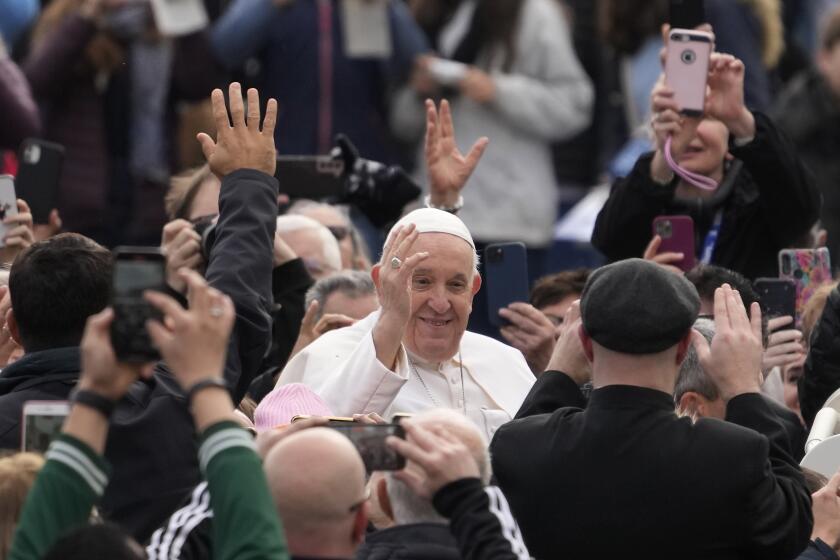Vatican document highlights church’s need to promote women and welcome LGBTQ+ people

- Share via
VATICAN CITY — An unprecedented global canvassing of Roman Catholics has called for concrete steps by the church to promote women into decision-making roles, for a “radical inclusion” of the LGBTQ+ community and for new accountability measures to check how bishops exercise authority.
The Vatican on Tuesday released the synthesis of a two-year consultation process, publishing a working document that will form the basis of discussion for a big meeting of bishops and laypeople in October. The synod, as it is known, is a key priority of Pope Francis, reflecting his vision of a church that is more about the faithful rank-and-file than its priests.
Francis has already made his mark on the synod, letting laypeople — and, in particular, women — have a vote alongside bishops. That reform is a concrete step toward what he calls “synodality,” a new way of being a church that envisions more co-responsibility in the key mission of spreading the Catholic faith.
The document highlights key concerns that emerged during the consultation process, which began at the local parish level and concluded with continent-wide assemblies. It flagged in particular the devastating impact that the clergy sexual abuse crisis has had on the faithful, costing the hierarchy its credibility and sparking calls for structural changes to remove the clergy’s near-absolute power.
The synthesis found a “unanimous” and “crucial” call for women to be allowed to hold positions of responsibility and governance. Without raising the prospect of women’s ordination to the priesthood, it asked whether ministries could be created or overhauled, including the diaconate — a reflection of a years-long call by some women to be ordained as deacons in the church.
The document noted that “most” of the continent-wide assemblies and “several” bishops conferences called for the diaconate question to be considered by the synod.
Pope Francis has been discharged from the Rome hospital where he had abdominal surgery nine days ago to repair a hernia and remove painful scarring.
The document also asked what concrete steps the church can take to better welcome LGBTQ+ people and others who have felt marginalized and unrecognized by the church.
Perhaps most significantly, the document used the terminology “LGBT+ persons” rather than the Vatican’s traditional “persons with homosexual tendencies,” suggesting a level of acceptance that Francis ushered in a decade ago with his famous “Who am I to judge?” comment when a reporter asked about gay Catholics.
Even the seating arrangements for the synod are designed to be inclusive. Delegates are to be seated at round tables, with about a dozen laity and clergy mixed together in the Vatican’s big auditorium. Previously, synods took place in the Vatican’s theater-like synod hall, where cardinals and bishops would take the front rows, with priests, nuns and finally laypeople being seated in the back rows, far from the stage.
Unlike past working documents, the synthesis doesn’t stake out firm points, proposals or firm conclusions, but rather poses a series of questions for further discussion and debate by the synod itself. The synod process continues in 2024 with the second phase, after which Francis is expected to issue a concluding document considering the proposals that have been put to him by the assemblies.
Pope Francis, whose leadership of the Roman Catholic Church has resonated with many Californians, celebrates his 10th anniversary as pope on March 13.
The working document repeated a call for debate on whether married priests could be considered in order to relieve the clergy shortage in some parts of the world. Amazonian bishops had proposed allowing married priests to minister to the faithful who sometimes go months at a time without Mass, but Francis shot down the proposal after an Amazonian synod in 2019.
It called for more “meaningful and concrete steps” to offer justice to survivors of sexual abuse, and noted that the faithful have also been victims of other types of abuse: “spiritual, economic, power and conscience abuse.” Such abuses, it said, have “eroded the credibility of the church and compromised the effectiveness of its mission.”
It suggested that the church must reevaluate the way authority is exercised by the hierarchy, suggesting structural, canonical and institutional reforms to eradicate “clericalism,” or privilege that is afforded to clergy.
It acknowledged the fear and opposition that the synodal process has sparked among some bishops who see it as undermining their authority and power, but said that transparency and accountability were absolutely necessary and that bishops should even be evaluated as a way to rebuild trust.
Start your day right
Sign up for Essential California for the L.A. Times biggest news, features and recommendations in your inbox six days a week.
You may occasionally receive promotional content from the Los Angeles Times.
“The synodal process asks [bishops] to live a radical trust in the action of the spirit in the life of their communities, without fear that the participation of everyone need be a threat to their ministry of community leadership,” it said.
Even before the synod began, the document and the consultative process that preceded it were already having an effect.
Sister Nadia Coppa, who heads the umbrella group of women’s religious orders, said anyone who exercises governance in religious orders was being called to develop a new way of exercising authority.
“It will be important for us to propose a style of governance that develops structures and participatory procedures in which members can together discern a new vision for the church,” Coppa told a press conference.
More to Read
Sign up for Essential California
The most important California stories and recommendations in your inbox every morning.
You may occasionally receive promotional content from the Los Angeles Times.















